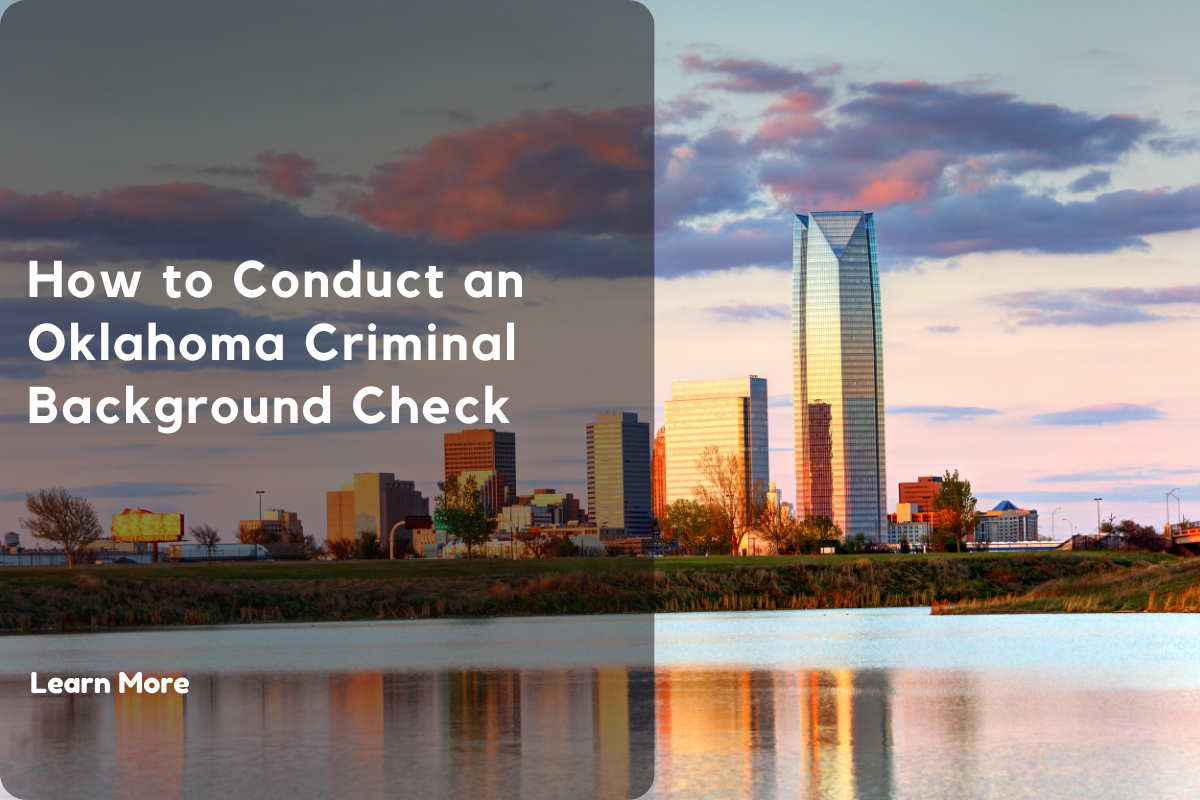 Introduction to Oklahoma Criminal Background Checks
Introduction to Oklahoma Criminal Background Checks
A criminal background check in Oklahoma is a process used to review an individual’s criminal history and ensure they do not have a history of criminal behavior that would pose a risk in certain situations. This check is a critical step for various entities such as employers, landlords, and other organizations to assess whether a person has any criminal offenses on their record that might affect their suitability for a job, tenancy, or other responsibilities. In Oklahoma, as well as in many other states, criminal background checks are an essential part of protecting businesses, individuals, and communities by providing information about a person’s past criminal behavior.
Purpose of Criminal Background Checks in Oklahoma
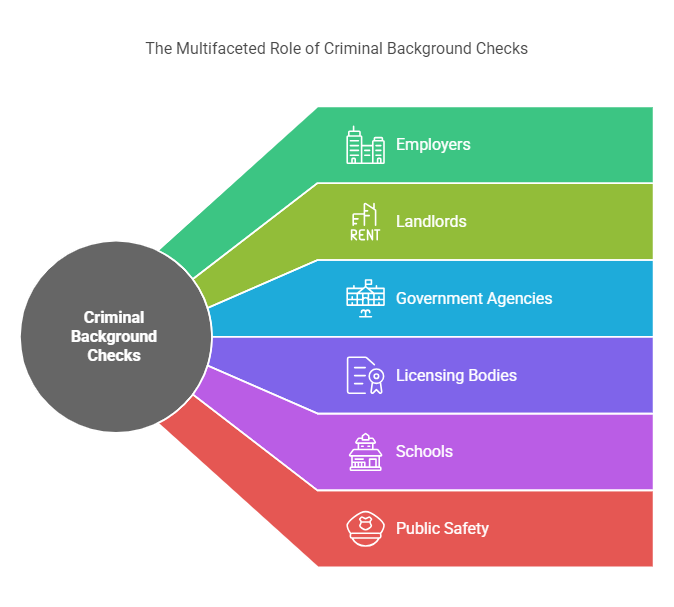
Criminal background checks in Oklahoma are often required in various scenarios. For example, employers typically require background checks as part of their hiring process to ensure the safety of their workplace and protect the integrity of the organization. Similarly, landlords often conduct background checks before renting to tenants to ensure they are not renting to individuals with a history of criminal behavior that could affect the safety and well-being of the community. Furthermore, certain government agencies, licensing bodies, and schools may require background checks as part of their screening process.
The importance of criminal background checks in Oklahoma cannot be overstated. For employers, it is a means to reduce the risk of hiring individuals who may pose a threat to the organization or its employees. For individuals, it helps protect their safety and peace of mind when hiring or renting properties. The checks also assist in ensuring that individuals with criminal records who have served their time and are attempting to reintegrate into society have the opportunity to demonstrate their rehabilitation. Therefore, conducting criminal background checks helps maintain a balance between public safety and individual rights.
Types of Criminal Records Included in an Oklahoma Criminal Background Check
A typical Oklahoma criminal background check reveals several types of criminal records, which may include:
- Felonies: Felonies are serious crimes that carry significant penalties, including lengthy prison sentences. Common felony offenses include murder, assault, drug trafficking, and burglary. These offenses are likely to appear on an individual’s criminal background check if they were convicted of a felony in Oklahoma.
- Misdemeanors: Misdemeanors are less serious crimes than felonies and typically result in less severe penalties. Examples include petty theft, public intoxication, and vandalism. Although misdemeanors are less serious, they can still affect a person’s ability to gain employment or secure housing, depending on the nature of the offense.
- Arrests: An arrest record does not necessarily indicate a conviction. However, it provides important information about whether an individual has been arrested for a criminal offense, even if charges were later dropped or the individual was not convicted.
- Convictions: A conviction occurs when an individual is found guilty of a crime, either after trial or through a plea agreement. Convictions can be for both felonies and misdemeanors. These offenses are typically the most significant information found in a criminal background check and can directly affect a person’s eligibility for certain jobs, licenses, or housing.
- Pending Charges: These are criminal charges that have been filed but have not yet been resolved in court. Pending charges can be important for understanding a person’s legal situation and potential future legal consequences.
Types of Offenses That May Appear in an Oklahoma Criminal Background Check
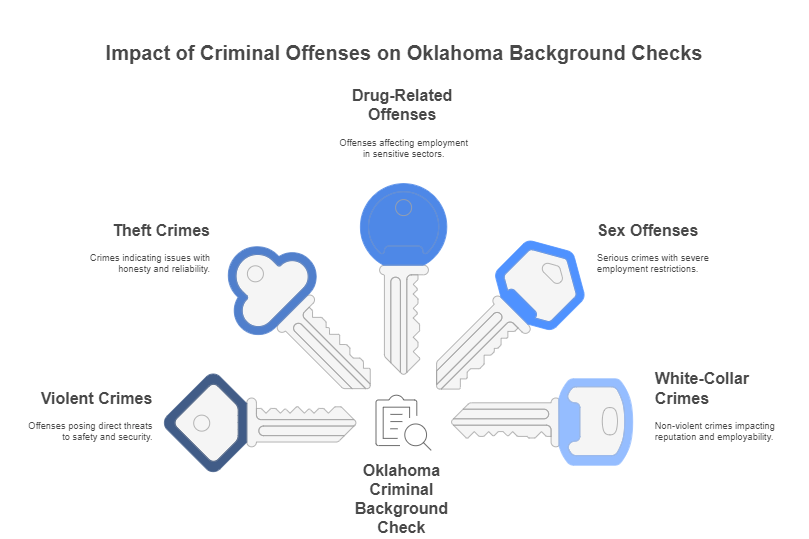
An Oklahoma criminal background check may reveal several categories of offenses. These offenses may vary in severity and consequences, and they often influence decisions made by employers, landlords, and other entities:
- Violent Crimes: These crimes include offenses like assault, battery, murder, and domestic violence. Violent crimes are typically the most concerning to employers and landlords because they pose a direct threat to safety.
- Theft Crimes: This category includes crimes such as burglary, shoplifting, larceny, and grand theft. Theft crimes can signal issues with honesty or reliability, which may raise concerns for employers and landlords.
- Drug-Related Offenses: Drug crimes are also common on criminal background checks and include offenses such as drug possession, drug trafficking, and drug manufacturing. These crimes can affect an individual’s ability to gain employment in certain sectors, especially those related to healthcare, law enforcement, or public safety.
- Sex Offenses: Sexual crimes, such as rape, sexual assault, child exploitation, and indecent exposure, often appear on criminal background checks. These offenses are taken very seriously, and individuals convicted of such crimes may face severe restrictions, especially in terms of employment in specific fields (e.g., education, healthcare).
- White-Collar Crimes: These crimes include offenses like fraud, embezzlement, money laundering, and identity theft. Although these crimes are non-violent, they can still have a significant impact on an individual’s reputation and employability.
- Driving Offenses: Certain driving-related crimes, such as driving under the influence (DUI) or driving while intoxicated (DWI), may appear on criminal background checks in Oklahoma. These offenses can be important for employers in industries where driving is a primary job function.
Requesting a Criminal Background Check in Oklahoma
In Oklahoma, individuals or organizations can request criminal background checks through the Oklahoma State Bureau of Investigation (OSBI). The OSBI is the state agency responsible for maintaining and providing access to criminal records. There are several ways to request a criminal background check in Oklahoma:
- Online Requests: The OSBI provides an online portal where individuals or entities can request background checks. This method is fast and convenient, allowing individuals to obtain a criminal history report from the comfort of their own home or office.
- Mail-in Requests: Individuals can also request criminal background checks by submitting a request via mail to the OSBI. This method may take longer than online requests, but it can still provide the necessary records for employers, landlords, or individuals seeking background check information.
- In-Person Requests: For those who prefer a more personal approach, the OSBI offers in-person services where individuals can visit the office and request their criminal background checks directly. This method allows for immediate assistance and faster processing times.
It is important to note that there is a difference between public records and sealed records. Public records are accessible to anyone who requests them, while sealed records are those that have been closed to the public for specific legal reasons. Some records may be sealed after a certain period of time, especially if the individual has shown evidence of rehabilitation.
Difference Between a State-Level and National-Level Background Check
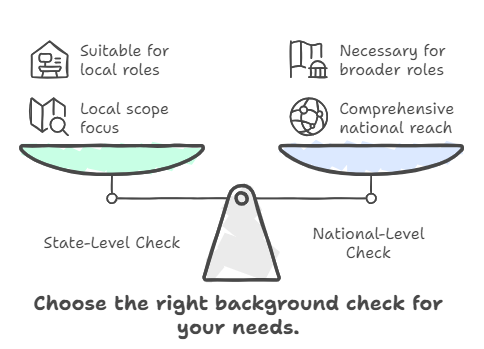
When requesting a criminal background check in Oklahoma, individuals and organizations may need to decide whether they need a state-level background check or a national-level background check.
- State-Level Background Check: A state-level background check will provide information on criminal offenses that have occurred within Oklahoma. This check will not include criminal offenses from other states or federal jurisdictions.
- National-Level Background Check: A national-level background check is more comprehensive and will include criminal records from all 50 states, as well as any federal offenses. This type of background check is generally required for positions where employees may work across state lines or handle sensitive information.
Both types of background checks have their advantages, depending on the scope of the screening required. For instance, a state-level check is generally sufficient for employers or landlords who are only concerned with criminal activity within Oklahoma, while a national-level check may be necessary for positions requiring a broader scope of background verification.
How to Conduct an Oklahoma Criminal Background Check
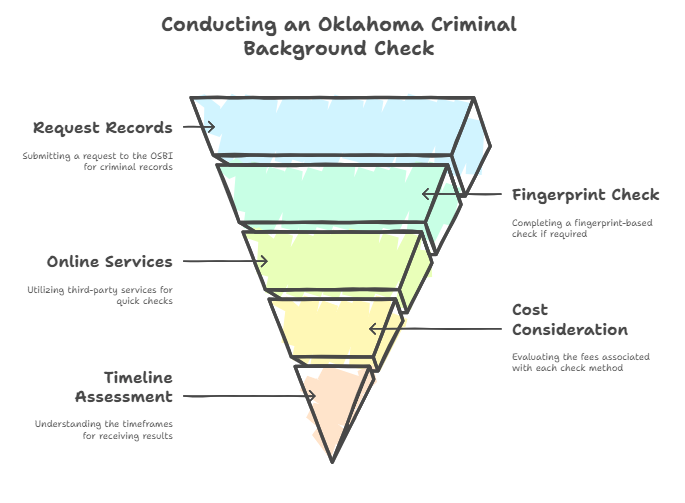
Conducting a criminal background check in Oklahoma is essential for employers, landlords, and other entities seeking to verify an individual’s criminal history. By understanding the steps involved and how to navigate the process, employers can ensure they are making informed decisions and complying with legal requirements. Below, we’ll break down the steps for conducting a criminal background check, including how to request records, the role of fingerprint-based checks, and the legal considerations surrounding the process.
1. Requesting Criminal Records from the OSBI
The Oklahoma State Bureau of Investigation (OSBI) is the primary authority responsible for processing and providing criminal background checks in the state. Individuals and employers can request a criminal background check through OSBI to obtain details about a person’s criminal history.
There are two main ways to request a background check from the OSBI:
- Online Requests: The OSBI provides an online portal where individuals can submit requests for criminal background checks. This is the most efficient method, allowing users to access results quickly.
- In-Person or Mail Requests: For those who prefer to submit their request in person or by mail, the OSBI also allows this option. However, the process may take longer, and additional paperwork may be required.
When making a request, applicants will need to provide specific information, such as the full name of the individual being checked, their date of birth, and any additional identifiers that may assist in locating the correct record.
2. The Role of Fingerprint-Based Background Checks
While online requests are common, some situations may require a fingerprint-based criminal background check. This is typically necessary for individuals applying for jobs in certain fields, such as healthcare, education, or law enforcement, where background checks are required by law. Fingerprint checks provide an added layer of security and accuracy, as they allow for the unique identification of individuals, reducing the risk of errors or misidentifications.
To complete a fingerprint-based check, individuals must visit a designated fingerprinting location, such as a law enforcement office or a fingerprinting service provider. Once the fingerprints are taken, they are submitted to the OSBI and other law enforcement agencies for processing.
3. Using Online Services for Criminal Background Checks
In addition to the OSBI, there are several third-party online services that provide access to criminal background check information. These services often allow users to conduct checks on individuals in a faster and more convenient manner, sometimes providing results within minutes.
While third-party services may be a convenient option for quick checks, it’s important for employers and others to verify that the service they are using is reputable and complies with the Fair Credit Reporting Act (FCRA) and other legal regulations. Always ensure that the service provider is accredited and follows proper procedures when obtaining criminal records.
4. The Cost of Obtaining a Criminal Background Check in Oklahoma
The cost of obtaining a criminal background check in Oklahoma can vary depending on the method used and the type of check requested. Here are the typical costs associated with each process:
- OSBI Online Background Check: The standard fee for an online criminal background check from the OSBI is generally around $15-$25 per request. This cost can vary based on the type of check and how quickly results are needed.
- Fingerprint-Based Check: When a fingerprint-based background check is required, the cost typically ranges from $50 to $75. This fee includes the cost of fingerprinting as well as the processing fee for the OSBI to complete the background check.
It’s important to note that if an employer or organization requests a background check on multiple individuals, the costs can add up quickly. Some employers may opt for bulk background check services or ongoing screening programs, which may offer discounts or bundled pricing.
5. The Timeline for Receiving Criminal Background Check Results
The timeline for receiving criminal background check results in Oklahoma can vary depending on the method used and the complexity of the check. Here’s a general breakdown of the timelines:
- Online Requests: For online requests made through the OSBI, results are typically available within 1 to 3 business days. However, processing times can vary, and in some cases, additional information may be required, which could delay the process.
- Fingerprint-Based Checks: Fingerprint-based checks may take longer to process, typically requiring 7 to 14 business days for results. This longer timeline is due to the additional steps involved in processing fingerprint data and verifying records through multiple databases.
For employers who require criminal background checks as part of their hiring process, it’s essential to plan ahead and account for potential delays. Having a clear timeline in place will help ensure that the hiring process proceeds smoothly.
6. Limitations and Restrictions on Access to Criminal Background Check Information
Not all individuals or entities can access criminal background check information in Oklahoma. There are certain limitations and restrictions that govern who can request and view criminal records:
- Employers: Employers in Oklahoma are allowed to request criminal background checks as part of their hiring process, but they must comply with federal and state laws, including the Fair Credit Reporting Act (FCRA), which mandates obtaining written consent from the individual being screened before conducting a background check.
- Landlords: Landlords may request criminal background checks on potential tenants as part of the rental application process. However, they must adhere to housing regulations and avoid discriminating against individuals based on their criminal history.
- Public Access: Certain criminal records are considered public records in Oklahoma and can be accessed by anyone, while others may be sealed or expunged, meaning they cannot be accessed without proper authorization. Expungement is the legal process of removing a criminal record from public databases, and individuals with sealed or expunged records may need to provide documentation to prove that their record has been cleared.
7. How Rapid Hire Solutions Can Help Employers
Rapid Hire Solutions offers a comprehensive range of services to assist employers in conducting thorough criminal background checks in Oklahoma. By partnering with a trusted screening provider like Rapid Hire Solutions, employers can ensure that their background checks are accurate, legally compliant, and efficient.
Rapid Hire Solutions offers tailored screening programs that can help businesses verify the criminal histories of potential employees quickly and seamlessly. Their services include access to both state and national criminal databases, reducing the risk of hiring individuals with undisclosed criminal histories. Additionally, Rapid Hire Solutions can help employers manage compliance with regulations like the FCRA and other state-specific laws, helping to ensure that the hiring process remains fair and transparent.
Employers can also benefit from Rapid Hire Solutions‘ expertise in navigating the complexities of criminal background checks, including guidance on how to handle adverse findings, how to comply with Ban the Box laws, and how to manage the information in a way that protects both the business and its employees.
8. Best Practices for Employers Conducting Criminal Background Checks
When conducting criminal background checks in Oklahoma, employers should follow several best practices to ensure legal compliance and make informed hiring decisions. These include:
- Obtain Written Consent: Employers must obtain written consent from the individual being screened before requesting a criminal background check. Failure to do so can lead to legal complications.
- Be Transparent: It’s essential for employers to be clear with candidates about the background check process and how the information will be used in the hiring decision.
- Adhere to Fair Hiring Practices: Employers must ensure that criminal background checks are used fairly and consistently across all candidates. This means taking into consideration the nature of the crime, how long ago it occurred, and whether it’s relevant to the position being applied for.
- Consider State Laws: Employers should stay informed about state and local regulations, including Ban the Box laws, which limit how and when criminal history can be considered in hiring decisions.
Legal Aspects, FAQs, and Conclusion
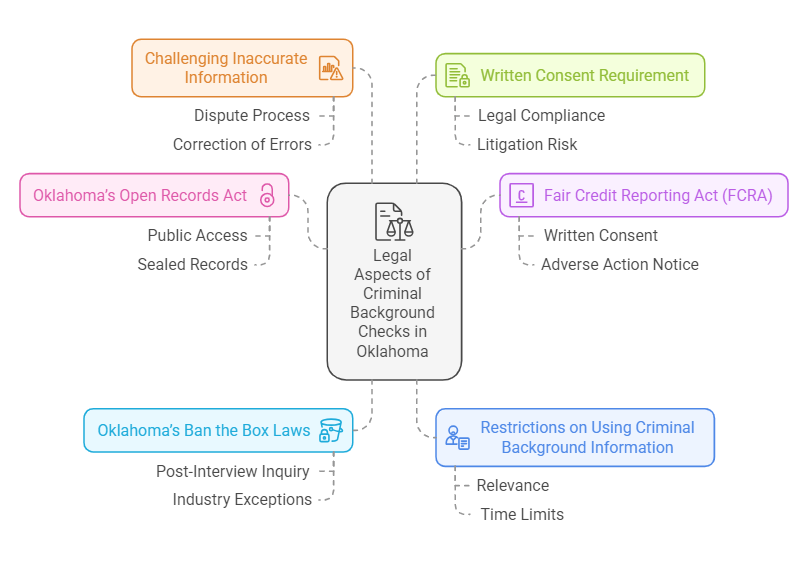
Understanding the legal aspects of criminal background checks in Oklahoma is crucial for employers, landlords, and individuals. Criminal background checks must be conducted within the parameters of both state and federal laws, which safeguard individuals’ rights while maintaining the integrity of the hiring, renting, and screening processes. This section will cover the legal considerations surrounding criminal background checks, frequently asked questions (FAQs), and conclude the article with key takeaways.
1. Legal Aspects of Criminal Background Checks in Oklahoma
Criminal background checks in Oklahoma are subject to several important laws and regulations. These laws ensure that background checks are conducted fairly and that individuals’ rights are protected. Below are the key legal aspects that both employers and individuals need to consider:
a) Oklahoma’s Open Records Act
The Oklahoma Open Records Act governs access to public records in the state, including criminal records. The law ensures that certain criminal records are accessible to the public, while others are sealed or expunged. However, this law also stipulates that certain personal information, such as social security numbers or financial data, is not accessible to the public.
Employers, landlords, and others requesting criminal background checks must comply with this act to ensure that they are accessing only the records they are legally permitted to view. When obtaining criminal background information, it’s critical to know whether the individual’s record is publicly accessible or sealed, as misuse of sealed or expunged records can lead to legal penalties.
b) The Fair Credit Reporting Act (FCRA)
The Fair Credit Reporting Act (FCRA) is a federal law that regulates the use of consumer information, including criminal background checks, in hiring and other employment decisions. The FCRA requires employers to:
- Obtain written consent from candidates before conducting background checks.
- Provide a pre-adverse action notice if a criminal record or other negative information will be used in making an employment decision.
- Notify candidates of the adverse action (e.g., not hiring the applicant due to criminal history) once the decision is made.
Employers must also provide candidates with the opportunity to dispute any inaccurate information on their criminal background report. The FCRA ensures that criminal background checks are used responsibly and that individuals are not unfairly discriminated against based on their criminal history.
c) Oklahoma’s Ban the Box Laws
In recent years, many states, including Oklahoma, have passed Ban the Box laws. These laws prohibit employers from asking about an applicant’s criminal history on job applications. The intent behind these laws is to give applicants a fair chance to be considered for employment based on their qualifications, without being immediately disqualified due to their past convictions.
Under Oklahoma’s Ban the Box law, employers are prohibited from asking about criminal convictions until after the initial interview or once a conditional offer has been made. However, certain industries, such as law enforcement and positions involving children or vulnerable populations, may have exceptions.
Employers should be aware of Ban the Box laws to avoid violating applicants’ rights and ensure their hiring practices are fair.
d) Restrictions on Using Criminal Background Information in Hiring
While criminal background checks can be valuable tools for employers, they must use the information responsibly. There are legal restrictions on how criminal records can be used in hiring decisions:
- Relevance: Employers can only consider criminal convictions that are relevant to the job in question. For example, a conviction for a financial crime might be relevant for a position in accounting but not for a warehouse worker.
- Time Limits: In some cases, employers can only consider crimes that occurred within a certain time frame. For example, misdemeanors or felonies may only be relevant if they occurred within the last 7 to 10 years.
- Equal Opportunity: Employers must ensure they are not discriminating against applicants based on their criminal history unless it is directly related to the job or the safety of the workplace.
e) Challenging Inaccurate Information on Criminal Background Checks
Individuals have the right to challenge any inaccurate information found on their criminal background check. If an applicant believes the report contains errors, they can dispute the findings with the reporting agency. The agency is then required to investigate and correct any inaccuracies.
This right is vital for ensuring that people are not unfairly penalized for mistakes or outdated information. Employers should be aware of this process and provide applicants with the opportunity to address any discrepancies before making final decisions.
f) Written Consent Requirement
As part of the FCRA and other relevant state laws, employers must obtain written consent from an individual before conducting a criminal background check. This is a crucial step in ensuring transparency and protecting an applicant’s privacy. Failure to obtain proper consent could lead to legal consequences for the employer and the potential for litigation from the affected individual.
2. Frequently Asked Questions (FAQs)
Here are answers to some of the most common questions regarding criminal background checks in Oklahoma:
How Long Does It Take to Get a Criminal Background Check in Oklahoma?
The timeline for receiving results from a criminal background check in Oklahoma varies based on the method used:
- Online checks: Typically, results are available within 1-3 business days.
- Fingerprint-based checks: These can take 7-14 business days due to the extra processing involved.
What Crimes Show Up on an Oklahoma Criminal Background Check?
Criminal background checks in Oklahoma can reveal a variety of offenses, including:
- Felonies
- Misdemeanors
- Arrests (without convictions)
- Convictions
- Drug offenses
- Violent crimes
- Theft and fraud offenses
Certain crimes may be expunged from records, and these will not appear in background checks if the individual has successfully gone through the expungement process.
Can Employers in Oklahoma Use Criminal Background Checks in Hiring Decisions?
Yes, employers in Oklahoma are permitted to use criminal background checks in hiring decisions. However, they must comply with state and federal laws, including obtaining written consent from the applicant and adhering to the FCRA. Employers must also be cautious not to discriminate based on irrelevant or outdated criminal history.
What Should I Do if There Is an Error on My Oklahoma Criminal Background Check?
If there is an error on your Oklahoma criminal background check, you can dispute the inaccurate information with the reporting agency, such as the Oklahoma State Bureau of Investigation (OSBI). The agency will investigate the issue and correct any mistakes if necessary. It’s important to ensure that all details on your report are accurate before making decisions based on the information.
How Much Does an Oklahoma Criminal Background Check Cost?
The cost of an Oklahoma criminal background check varies depending on the type of check requested. Standard online checks cost around $15-$25, while fingerprint-based checks are typically priced between $50-$75.
Employers should factor in these costs when developing their hiring and screening procedures.
How Long Does It Take to Get a Criminal Background Check in Oklahoma?
The timeline for receiving results from a criminal background check in Oklahoma varies based on the method used:
- Online checks: Typically, results are available within 1-3 business days.
- Fingerprint-based checks: These can take 7-14 business days due to the extra processing involved.
What Crimes Show Up on an Oklahoma Criminal Background Check?
Criminal background checks in Oklahoma can reveal a variety of offenses, including:
- Felonies
- Misdemeanors
- Arrests (without convictions)
- Convictions
- Drug offenses
- Violent crimes
- Theft and fraud offenses
Certain crimes may be expunged from records, and these will not appear in background checks if the individual has successfully gone through the expungement process.
Can Employers in Oklahoma Use Criminal Background Checks in Hiring Decisions?
Yes, employers in Oklahoma are permitted to use criminal background checks in hiring decisions. However, they must comply with state and federal laws, including obtaining written consent from the applicant and adhering to the FCRA. Employers must also be cautious not to discriminate based on irrelevant or outdated criminal history.
What Should I Do if There Is an Error on My Oklahoma Criminal Background Check?
If there is an error on your Oklahoma criminal background check, you can dispute the inaccurate information with the reporting agency, such as the Oklahoma State Bureau of Investigation (OSBI). The agency will investigate the issue and correct any mistakes if necessary. It’s important to ensure that all details on your report are accurate before making decisions based on the information.
How Much Does an Oklahoma Criminal Background Check Cost?
The cost of an Oklahoma criminal background check varies depending on the type of check requested. Standard online checks cost around $15-$25, while fingerprint-based checks are typically priced between $50-$75.
Employers should factor in these costs when developing their hiring and screening procedures.
3. Conclusion
Criminal background checks in Oklahoma are an essential part of the hiring, renting, and screening process. Whether you are an employer, landlord, or individual, understanding the process, legal requirements, and limitations of criminal background checks is crucial to ensuring compliance and protecting your business or personal interests.
By adhering to the rules set forth by the Oklahoma Open Records Act, FCRA, and other relevant regulations, employers and other entities can make informed decisions while maintaining fairness and transparency in their processes. It is also important for employers to consider professional services, such as Rapid Hire Solutions, to streamline and enhance their criminal background check procedures.
Criminal background checks help to foster a safe, compliant, and productive environment, ensuring that employers and landlords make decisions that protect their interests and their communities. By following the outlined best practices and legal considerations, you can conduct criminal background checks confidently and responsibly.
